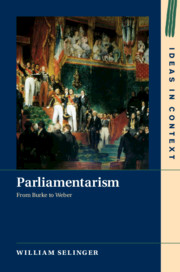Book contents
- Parliamentarism
- Ideas in Context
- Parliamentarism
- Copyright page
- Contents
- Acknowledgments
- Introduction
- Chapter 1 The Eighteenth-Century House of Commons
- Chapter 2 Edmund Burke’s Theory of Parliamentary Politics
- Chapter 3 The French Revolution and the Liberal Parliamentary Turn
- Chapter 4 Reinventing Parliamentarism: The Significance of Benjamin Constant
- Chapter 5 Democracy in America, Parliamentarism in France: Tocqueville’s Unconventional Parliamentary Liberalism
- Chapter 6 John Stuart Mill and the Victorian Theory of Parliament
- Conclusion
- Bibliography
- Index
- Ideas in Context
Chapter 2 - Edmund Burke’s Theory of Parliamentary Politics
Published online by Cambridge University Press: 05 July 2019
- Parliamentarism
- Ideas in Context
- Parliamentarism
- Copyright page
- Contents
- Acknowledgments
- Introduction
- Chapter 1 The Eighteenth-Century House of Commons
- Chapter 2 Edmund Burke’s Theory of Parliamentary Politics
- Chapter 3 The French Revolution and the Liberal Parliamentary Turn
- Chapter 4 Reinventing Parliamentarism: The Significance of Benjamin Constant
- Chapter 5 Democracy in America, Parliamentarism in France: Tocqueville’s Unconventional Parliamentary Liberalism
- Chapter 6 John Stuart Mill and the Victorian Theory of Parliament
- Conclusion
- Bibliography
- Index
- Ideas in Context
Summary
It has frequently been argued that Edmund Burke’s account of the English constitution was based in Montesquieu’s. This chapter demonstrates that Burke favored a more powerful House of Commons than Montesquieu and that he wished for the House of Commons to be moderated not through the Crown’s veto but rather through a dignified constitutional monarch and the presence of ministers in the assembly. Burke was the great eighteenth-century theorist of parliamentarism. He also struggled with the great challenge of parliamentarism–ministers holding power through the corrupt use of patronage–and it was in response to this challenge that he offered his famous theory of political parties. Importantly, Burke argued for the emerging practices of parliamentarism not only within British politics (where he feared that George III wanted to escape the control of the House of Commons) but also during the French Revolution, as Burke believed that France’s rejection of the parliamentary model was among its greatest errors.
Keywords
- Type
- Chapter
- Information
- ParliamentarismFrom Burke to Weber, pp. 59 - 82Publisher: Cambridge University PressPrint publication year: 2019

